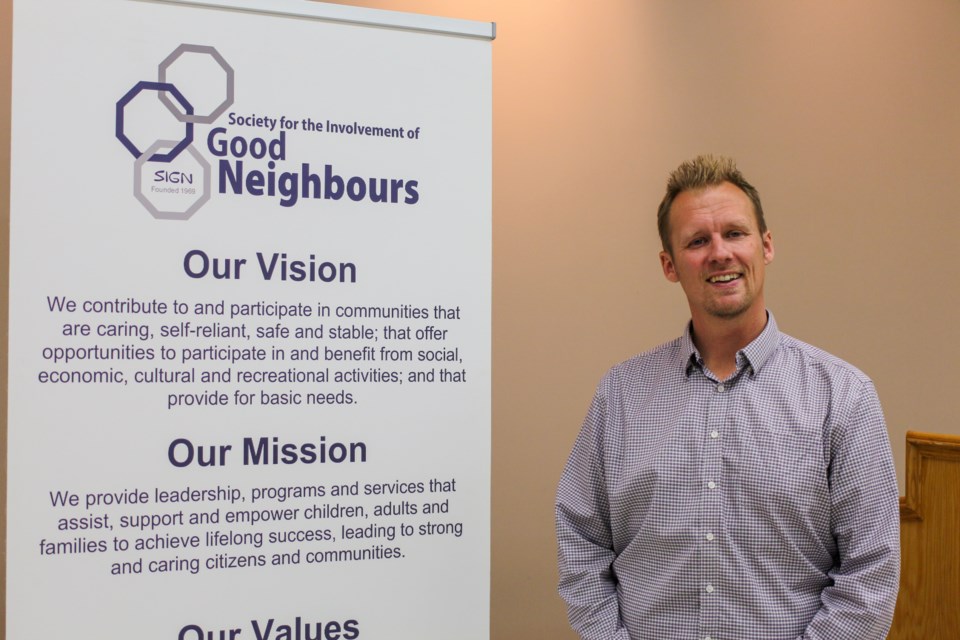YORKTON – SIGN is now set to deliver rapid access counselling services to children, youth and their caregivers.
The launch is part of the Government of Saskatchewan's new $1.7M annual funding to Family Services Saskatchewan to expand its Rapid Access Counselling Program according to a news release from the Government of Saskatchewan.
"Young people can access support for mental health challenges ranging from stress and depression to family conflict, addictions and domestic violence," continued the release.
"This is available all over the province and it's been rolling out for the last series of months here," said Benjamin Swanson, Lead Counsellor for Rapid Access Counselling at SIGN Yorkton, in an interview with Yorkton This Week.
"We're the newest one to open up but it's everywhere as far as Prince Albert down south," added Swanson.
Swanson said that though offering the service to children is new, the model of RAC has existed for in the city for several years.
"We have a Masters level social worker [at SIGN] who spearheaded this about seven years ago but only initially doing it for adults," said Swanson, adding, "the difference between the youth model and her model is just age demographic."
"We have the facilities in place such as Counselling Connect — it's a website anyone in our province can go to — they can see the availability of the counsellors," said Swanson.
Swanson said the website basically works as such:
"If you're a parent and you're looking for some support for your seven-year-old child you can go on and click youth counselling and see the available people within the two-week period and then you click the modality you'd like to do," said Swanson, adding, "so if you wanted to do virtual counselling you can select virtual — I get a prompt on my end saying I have a client in Prince Albert who would like virtual counselling."
From there, Swanson said there would be a quick a prep with the parent of the child and the counselling would proceed virtually from there.
"Our reach is huge — province-wide — but that's also supported by a variety of centres ... across the province who are able to support in-house counselling," said Swanson.
Swanson said the program is viable because "it not only affords people immediate access to counselling wherever they are — removing transportation as a barrier — it also promotes the inclusion and ability of in-person counselling locally across the province with the large variety of centres we do have."
Swanson said RAC is only accepting mild to moderate periods of escalation.
"If we need to help them get back to their center we can have those moments and allow de-escalation and come up with strategies," said Swanson, "if they are needing them to move forward they can incorporate them into their daily lives using the same model that's been really effective in the RAC for adults."
"We're able to incorporate the parents into that therapy practice as well as parents can keep on with those skills with their kids," said Swanson.
Swanson said that coaching a parent in measures to help with anxiety can help them with themselves and their children.
"If you've identified that in your child we can do a collaborative session where we can all come up with tools together," said Swanson, "it's highly effective."
"Our model is not for the ongoing practice — it's for short bursts — if we're able to help in that short burst — fantastic," said Swanson, adding, "hopefully we can get some tools so that therapy can keep on at home and if not we're going to refer on to whomever is appropriate."
As for the effect on the community, Swanson said the increased range of the demographics will be beneficial to those needing the support the program offers.
"Now we have increased our range from –°¿∂ ”∆µ 18+ down to six-years-old and provide the same immediate service for clients who need the support," said Swanson, noting, "we are free of charge — we're eliminating all the barriers that we can possibly avoid — transportation, finance — we accept everybody."
"There's no cost. It's not prohibitive," said Swanson, "communities who would historically go without now have access to it."
"If we're talking about socially distant franchise communities without stable equity they're going to inherently face those barriers," said Swanson, "if you're living without the ability to fill your gas tank or have a car ... getting therapy may not be on the forefront of your mind — doesn't mean you have any less need or desire for it — so we're allowing reach not only in the breadth of who we can serve but also the demographics."
In total this year, the province is providing Family Services Saskatchewan with $3.2 million in annual funding: $1.7 million in new funding for expanding rapid access counselling services to children and youth, and $1.5 million to provide ongoing services to adults and families in more than 20 communities, according to the news release.
Along with the expanded demographics for RAC, Swanson said SIGN is incorporating aspects of a modality called Theraplay.
"... it's providing therapy for children in a way they are familiar in expressing themselves and creating that nurturing engaging relationship between those children and their parents in addition to the basis of cognitive behavioural therapy," said Swanson.
"It's awesome," said Swanson of the program's expansion, "it's creating a huge amount of outreach and really is going to support our community and hopefully empower our children."




